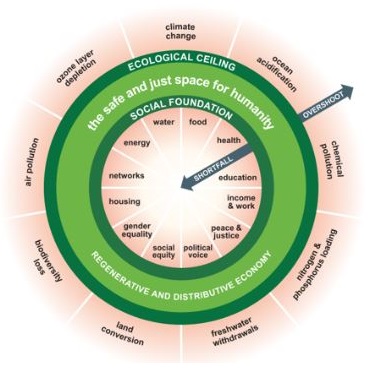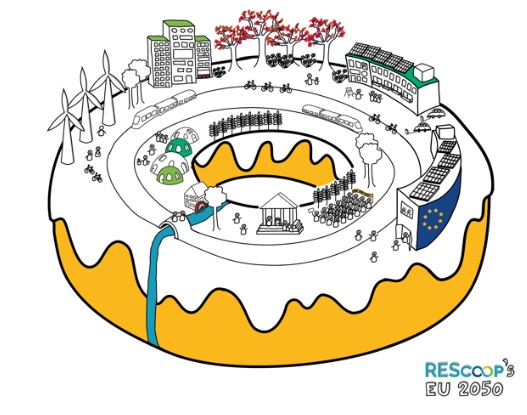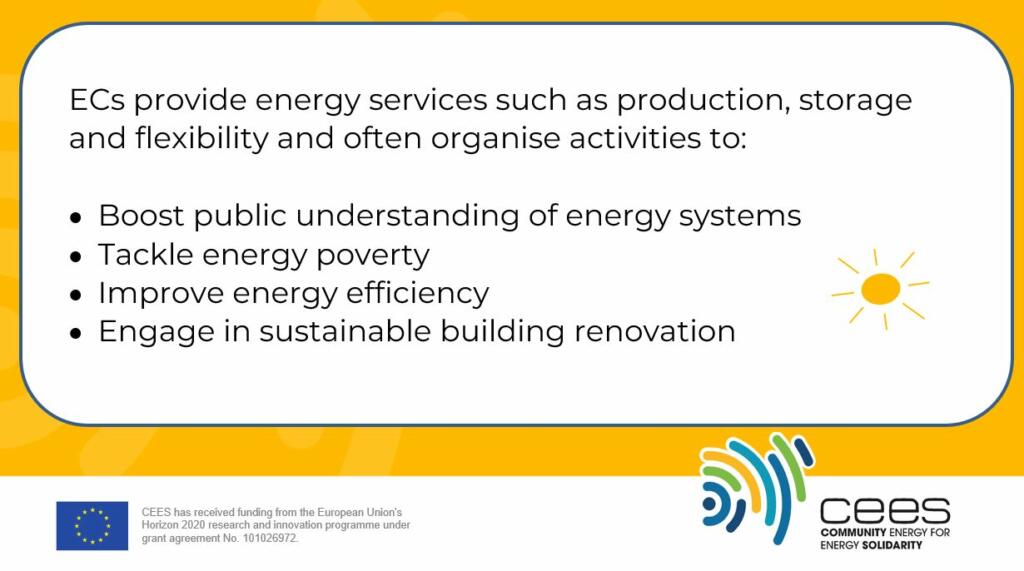Energy communities are realising a radical new societal vision, founded on principles of sufficiency, sustainability and social justice – and increasingly in line with the values of a ‘doughnut economy’.
Building a sense of local engagement is a key principle of energy communities (ECs). Depending on local customs, that might mean getting members together over coffee or tea and cake, cookies, biscuits or doughnuts.
In the context of EU Sustainable Energy Week 2023 (EUSEW 2023), Heleen Schockaert (Project Manager at REScoop.eu) prompted participants to consider how ECs fit within the emerging concept of a doughnut economy. Developed by British economist Kate Raworth (University of Oxford), this visualises a society that meets all of its needs within a ‘ring’ defined by social and economic boundaries that ensure a sustainable future (Figure 1).

The inner circle in Raworth’s model represents the social foundation that ensures everyone has access to the essentials for a comfortable and dignified life. In addition to the basics (e.g. food and water) for meeting physical needs, the foundation includes human rights such as gender equality, access to education and having a political voice. Notably, access to clean and affordable energy makes the list.
The outer ring is the ecological ceiling – the limits at which humanity can tap into physical resources to meet these basic needs without putting vital Earth systems at peril. The fact that we are currently surpassing this ceiling, Raworth argues, is triggering the interlinked problems of air pollution, biodiversity loss, ocean acidification and, indeed, climate change.
Striving to operate within the band between these two circles – the ‘sweet spot’ of the doughnut – could support a more just and sustainable society.
Comparing two countries historically tied through brutal colonialism – Belgium and the Democratic Republic of Congo (DRC) – Schockaert describes where they are on the doughnut in 2023. Belgium is disregarding its ecological ceiling and overshooting its planetary boundaries while the DRC lacks the essential social foundations of life. But there’s more: the reality of a shared ‘home’ means that Belgium’s overshoot has negative effects on the DRC.
Clearly, the status quo is exacerbating risks for humanity and the planet.
With the aim of delivering a safe and just society, the doughnut proposes an alternative model, based on the principle of ‘sufficiency’. Starting from the question ‘How much do we need, and why?’,[i] sufficiency refers to the aim of ensuring well-being for all in society while staying within planetary boundaries. In turn, it sets clear consumption limits,[ii] that seek to narrow the inequality gap by ensuring fair access to space and resources. Sufficiency can be both a foundational principle for policy making and a personal value that people practice in their daily lives.
Energy communities are a natural fit in a doughnut economy
“Today’s challenges and crises, as well as opportunities, push and oblige us to break the boundaries of how we see ourselves in the world and where we see ourselves moving towards,” says Schockaert. Indeed, recognising that the fundamental principles of ECs align well with those of a doughnut economy, REScoop.eu has created its own visualisation of an energy transition (Figure 2).

ECs prioritise sufficiency over extraction or unlimited growth and view energy as a common, not a commodity. Starting from the principle that access to energy is a basic human right, ECs believe it should be distributed fairly among the population rather than traded on open markets to maximise shareholder profits.
Distributed renewables create new opportunities for energy systems to operate as ‘common goods’, i.e. owned and operated by cooperative members who typically enjoy lower cost electricity and collectively decide how to disburse any profits that arise from energy produced.
Indeed, ECs that engage with citizens can help solve local energy problems that governments and large companies cannot. By mobilising citizens, ECs can work towards the common goal of keeping civilisation safely between the social foundation and the ecological ceiling.
Community energy for a just, clean – and local – energy transition
The EU strategy for a just, clean energy transition recognises the key role of ECs in helping empower citizens to practice energy democracy through locally-owned energy systems. REScoop.eu, the European Federation of Citizen Energy Cooperatives, is a vital entity for taking this forward. Representing ~1.5 million citizens through more than 2 250 citizen energy cooperatives (CECs), REScoop.eu has helped lobby for policies that enable CECs to, in turn, bring social and economic value to the communities in which they operate. During the recent energy crisis, some CECs have been able to shield their members from soaring energy prices.

Brixton Solar, in London, UK, has brought EC principles to tenants in social housing. In return for making a small investment, tenants receive – for free – a limited amount of the electricity produced by solar panels on the roofs of buildings where they live. Part of revenues realised from selling electricity into the grid is directed into a dedicated energy efficiency fund that can be used, for example, for workshops to help people reduce energy waste and their energy bills. The cooperative also provides training (through internships) for local youth.
The EC movement still faces many challenges. Sustainably sourcing the materials critical for renewable energy infrastructure is a major issue. At the local level, underrepresentation of different social groups is an ongoing concern within EC initiatives. But across Europe, ECs are taking action to bring change, with a clear vision to ensure all citizens can enjoy a dignified life while we collectively respect the boundaries of the Planet.
[i] ifeu – Institut für Energie- und Umweltforschung Heidelberg https://www.ifeu.de/en/topics/energy/sufficiency/#:~:text=Sufficiency%20is%20a%20sustainability%20strategy,and%20associated%20negative%20environmental%20impacts
[ii] Buildings & Cities https://www.buildingsandcities.org/insights/commentaries/cop26-sufficiency.html